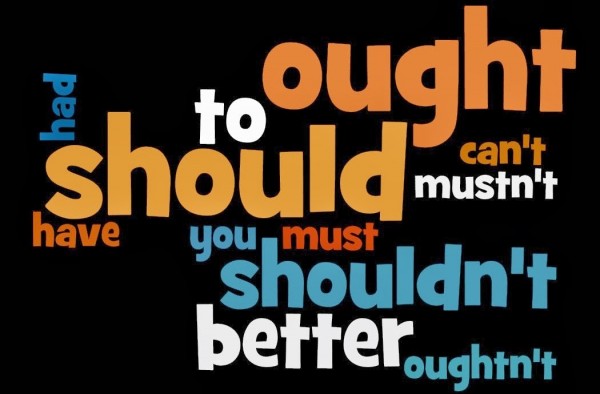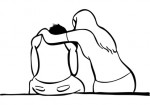Time to stop the SHOULDS, MUSTS and OUGHTS
 An area I pick up on in my coaching is language which can lead to why we end up seeking out a coach.
An area I pick up on in my coaching is language which can lead to why we end up seeking out a coach.
These particular words can create havoc for many of us for example…
You SHOULD
You MUST
You OUGHT
How many times a day do you use the word “should” about yourself or other people?
For example do you say, “I should really do… I must call…I ought to…”?
How often do you hear someone say they are feeling rubbish to then hear a long list of SHOULDS, OUGHTS and MUSTS.
For example, “I’m having a rubbish time I really must/ should/ ought…..”
But why “should” you?
Surely you can decide for yourself?
When I am coaching people I hear SHOULDS, MUSTS and OUGHTS all the time.
People “SHOULD” themselves about loads of things during the day but actually these “SHOULDS” are not helpful and can leave you feeling less confident and inadequate.
Also we are all guilty of using “SHOULDS” with other people.
So how can you replace “SHOULDS” with healthier language?
For now, I’ve found some alternatives helpful in overcoming my habit of “SHOULD-ing” myself and other people…
Alternatives to “Should”
1. Focus on the benefits.
Instead of telling myself I “should” be doing more of something, I try to focus on why I WANT to do that particular thing.
Instead of saying “I should do more yoga” I remind myself of why I want to do this e.g. “I feel great when I do yoga a few times each week,”
“I enjoy feeling myself relax and stretch out when I do yoga,” or “I feel a greater sense of self-connection when I make time to connect my body and my breathing in yoga.”
2. Focus on how the activity fits with your values.
One of the biggest things I used to “should” myself about was being on time. I struggled to turn up on time for work, appointments, meeting up with friends, and pretty much anything that was due to start at a set time. It was a constant battle with myself and, of course, telling myself “You should be on time” or “You shouldn’t be late” did nothing to change my tardiness.
Instead, I started reframing this from the perspective of my values.
I started telling myself “It’s really important to me to be on time,” or “I want to live with integrity and do what I say I’m going to do, when I say I’m going to do it.”
3. Focus on accepting and exploring reality.
I used to think that I shouldn’t feel angry or jealous.I had heard they were “unhealthy” feelings to experience and had the belief that there was something wrong with me for feeling that way. No matter how much I told myself that I shouldn’t feel these things, however, they didn’t go away.
Now, I focus on accepting my experience. Instead of telling myself “I shouldn’t be feeling/thinking _____,” I take a step back and say “Okay, I’m feeling/thinking _____. I wonder why that’s happening now?”
Removing the word “should” from your vocabulary will take time, patience, and practice.
But it is possible, and it comes with great rewards.
Replacing “should” with more helpful dialogue will lead to a kinder relationship with yourself, and better relationships with people around you.
Coach yourself to success with my quick and easy online course
| Print article | This entry was posted by Denise on November 16, 2016 at 8:18 pm, and is filed under Personal Development. Follow any responses to this post through RSS 2.0. Both comments and pings are currently closed. |
Comments are closed.





